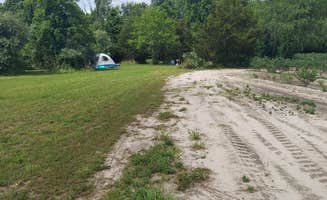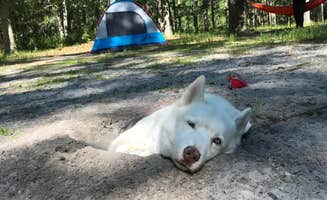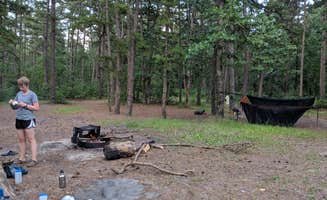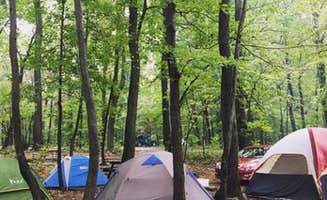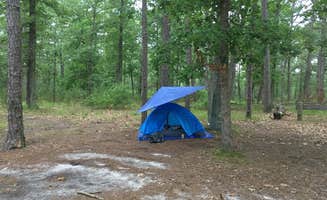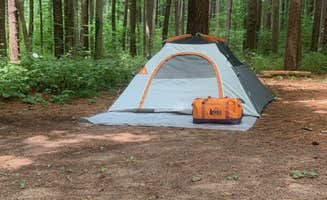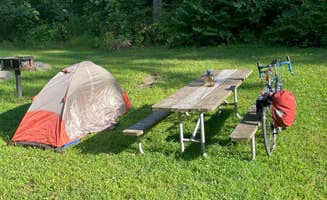Tent campsites near Wenonah, New Jersey sit within the Atlantic Coastal Plain, characterized by flat terrain with sandy soil and pine forest coverage. The region experiences warm, humid summers with temperatures typically reaching 85-90°F between June and August, while spring and fall offer milder camping conditions. Most primitive sites in this area require campers to filter drinking water or bring their own supply due to limited potable water sources.
What to do
Creek exploration: Investigate the waterways at Evansburg State Park where campers can wade through shallow streams. The park offers multiple water access points with relatively gentle currents suitable for wading. "Great place to creek hike, nice for horses, we did get a lot of ticks, but not deer ticks, thankfully," notes one visitor.
Birdwatching: Pack binoculars for hawk watching at Fort Washington State Park from September through November. The dedicated observation deck provides optimal viewing of migrating raptors. "From this very spot you can view the beautiful raptors that migrate here on a seasonal basis in both the Spring and Autumn," reports a camper.
Backcountry hiking: The 5+ mile trail from Atsion to Lower Forge Camp offers a flat route ideal for beginners practicing with loaded packs. The trail follows the Batona Trail system and provides access to remote camping. "Great for beginners who you're trying to break into backpacking," shares one experienced hiker.
What campers like
Privacy: Many tent campsites near Wenonah feature secluded spots set back from main camping areas. At Batona Campground, campers appreciate the separation from crowds. "It is so easy to get lost in these woods and I LOVE IT! If you want off the beaten path and not close to anyone... this is IT!" explains one enthusiastic visitor.
Water access: Camping near rivers and lakes provides convenient paddling options without needing to transport equipment far. Wharton State Forest offers multiple water-adjacent sites. "Our site was very quiet... It's only a one minute walk from the parking area to the site. Our site was right next to the Mullica River, and had excellent views," shares a visitor to Goshen Pond.
Flat terrain: The Pine Barrens region offers mostly level ground for easier tent setup. First-time campers find the flat sites manageable. "The boyfriend and I stayed for a weekend at one of the primitive tent sites. Our site was private and secluded. We had a great time," reports a camper about their Goshen Pond experience.
What you should know
Limited facilities: Most primitive sites offer only basic amenities with vault toilets. The Mullica River Campground provides minimal facilities. "There is a pit toilet, but did not check its status," notes one camper. Another adds, "Start hike kayak trIp at 206 hike 6 miles in camp then hike kayak out 5 miles to batsto."
Sandy roads: Access to many Wharton State Forest campgrounds involves navigating unpaved sandy roads. Vehicles without 4WD may struggle during wet conditions. "The road into the campground is about 1 mile of loose sand. It can be accessed by a standard vehicle," one camper explains about Batona Campground.
Insect preparation: Beyond tick protection, campers should prepare for mosquitoes and chiggers from May through September. Long pants, closed shoes, and insect repellent with at least 20% DEET provide necessary protection. "NOTE: There are LOADS of ticks in this area," warns one Mullica River camper.
Tips for camping with families
Group sites: Abbott Sawmill campground offers spacious areas designed for family gatherings. Located near main roads but feeling remote, these sites accommodate multiple tents. "Close to the main roads but feels remote. Great for groups," notes a visitor.
Beginner-friendly options: Fort Washington State Park provides accessible group camping suitable for families new to outdoor experiences. The relatively flat terrain makes setup easier for those with children. "This place is great for first time campers," shares a camper who visits regularly.
Wildlife education: Use the Pine Barrens ecosystem as a natural classroom for kids to learn about unique plants and animals. The acidic waters and sandy soil create habitat for rare species. "I had the best time here hiking up and down the mini mountains. The water was clear and beautiful," recalls one enthusiastic visitor.
Tips from RVers
Size restrictions: Most tent campsites near Wenonah have limited access for large vehicles. At Tinicum Island, camping requires boat access only. "A great place to stay if you have a watercraft," explains a visitor, highlighting the vehicle-free nature of the site.
Alternative options: RVers seeking sites with hookups should consider Ridley Creek State Park's electric sites. While primarily tent-focused, some sites accommodate smaller RVs. "There's at least two fire pits per camp ground. There's only group camping. They give you firewood—if you bring your own, leave with any left over," advises one camper.
Parking logistics: Many primitive campgrounds require separate parking with walk-in access to actual sites. This arrangement means packing gear efficiently for transport from vehicle to campsite. "Only downside is having to haul gear by foot to the campsite. Some are further than others," notes a camper about Evansburg State Park.


